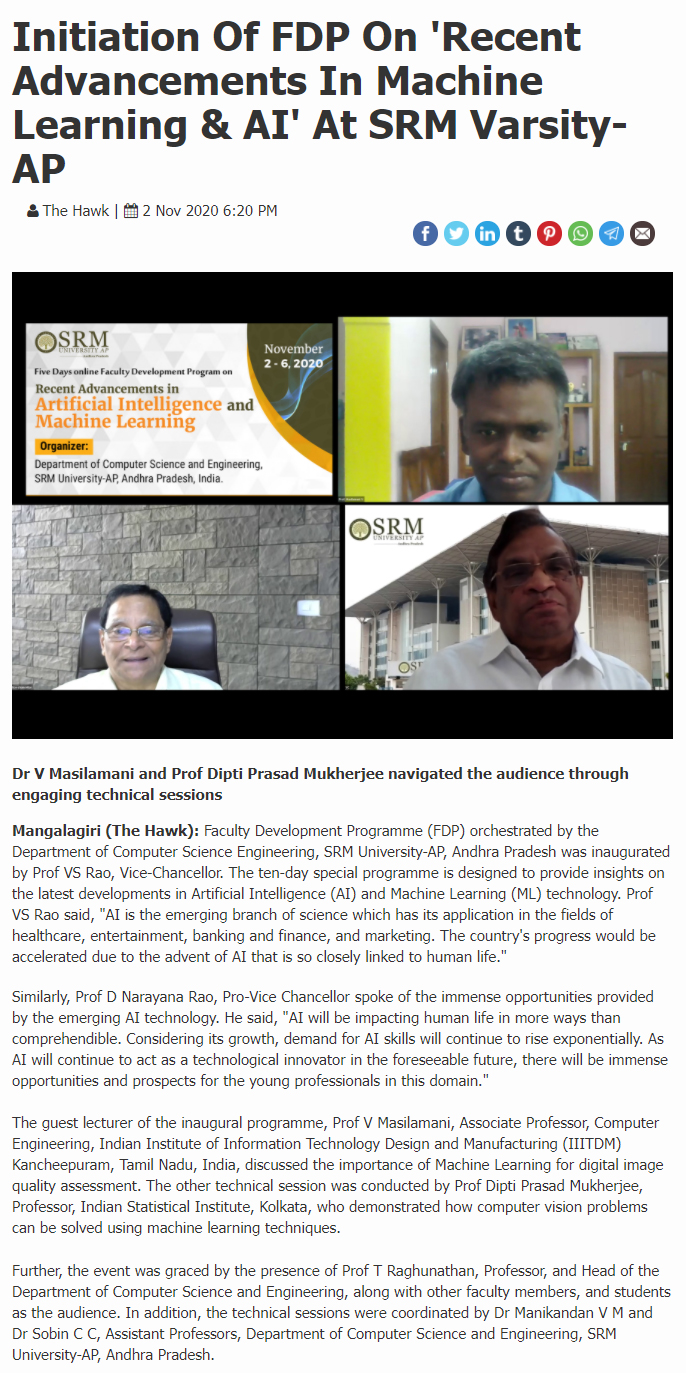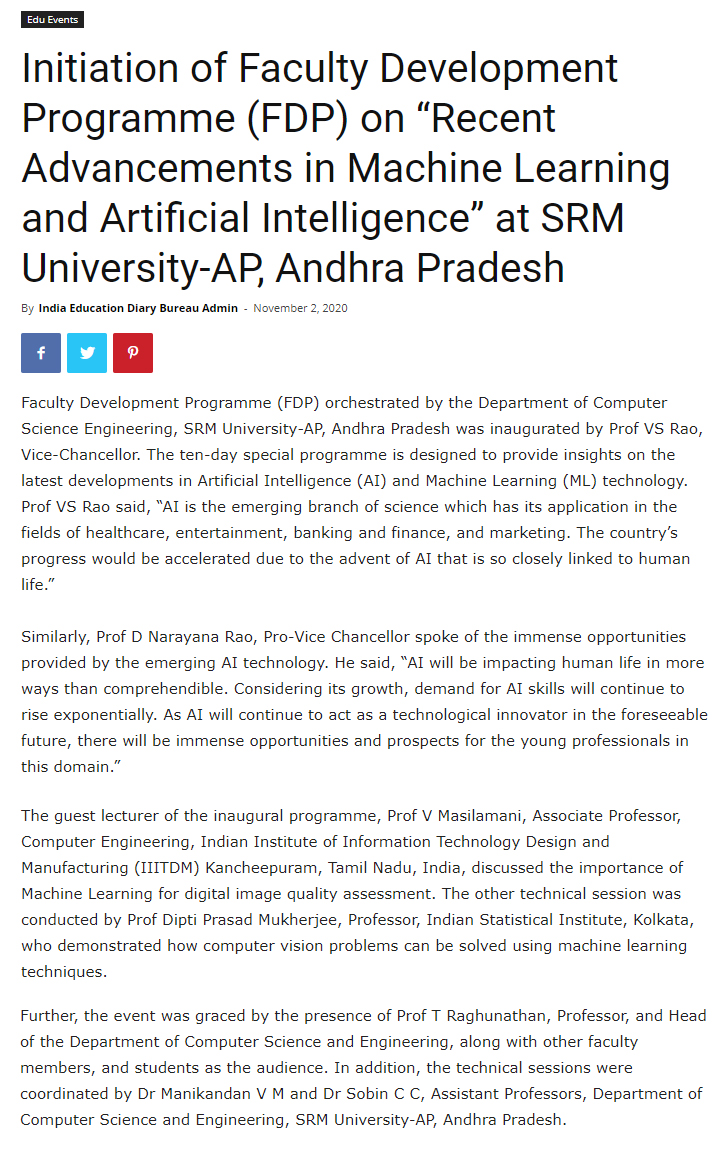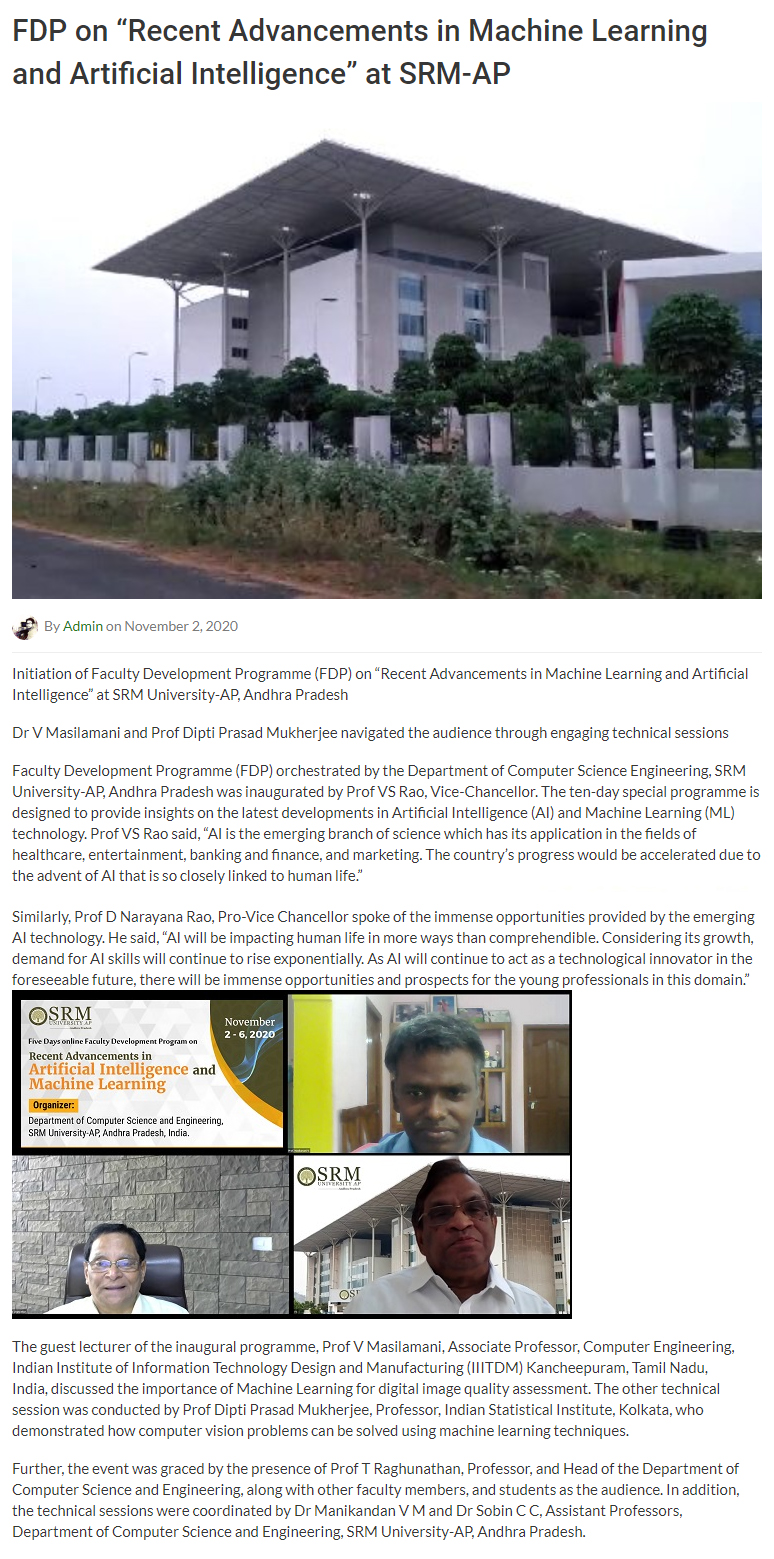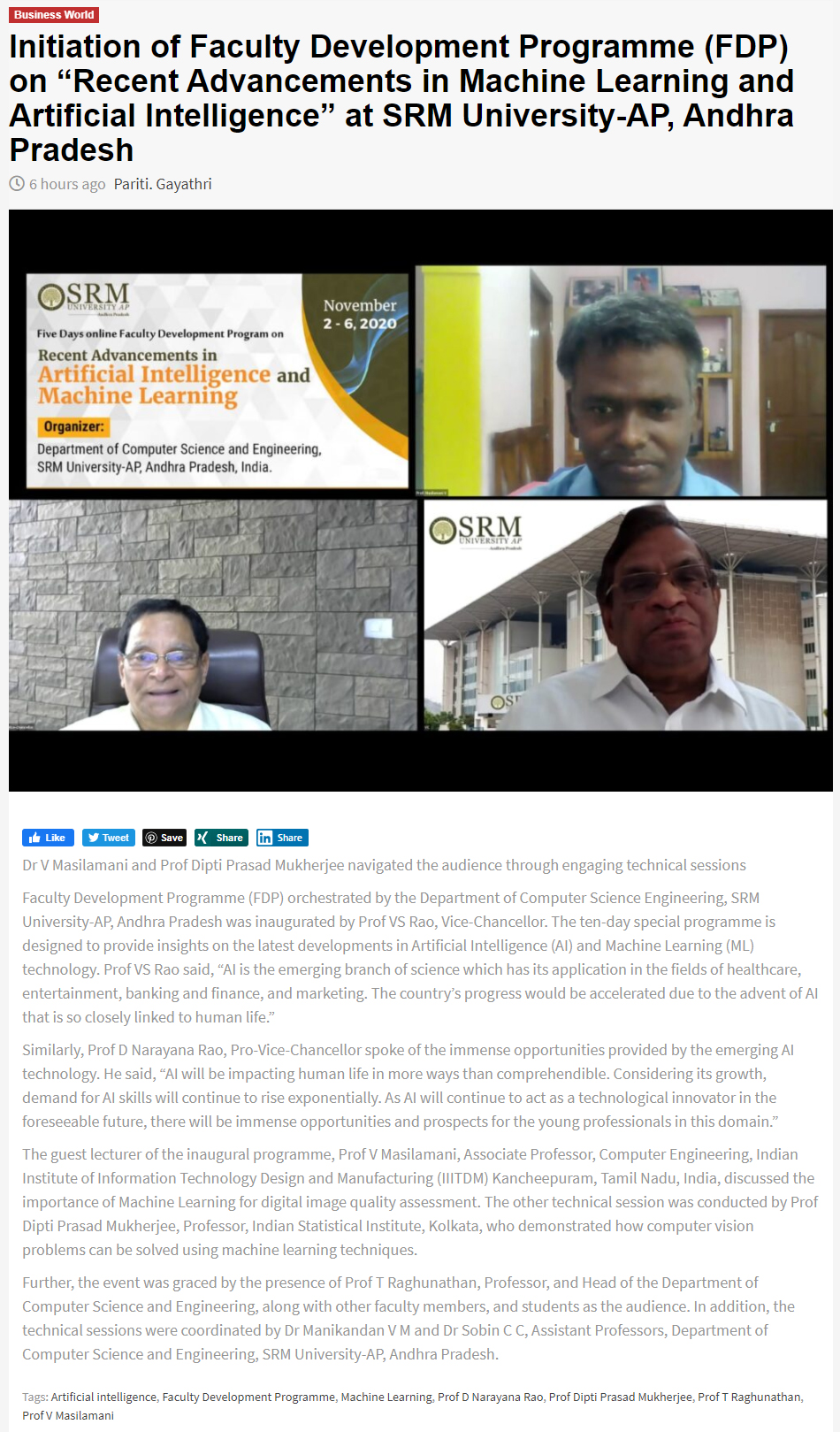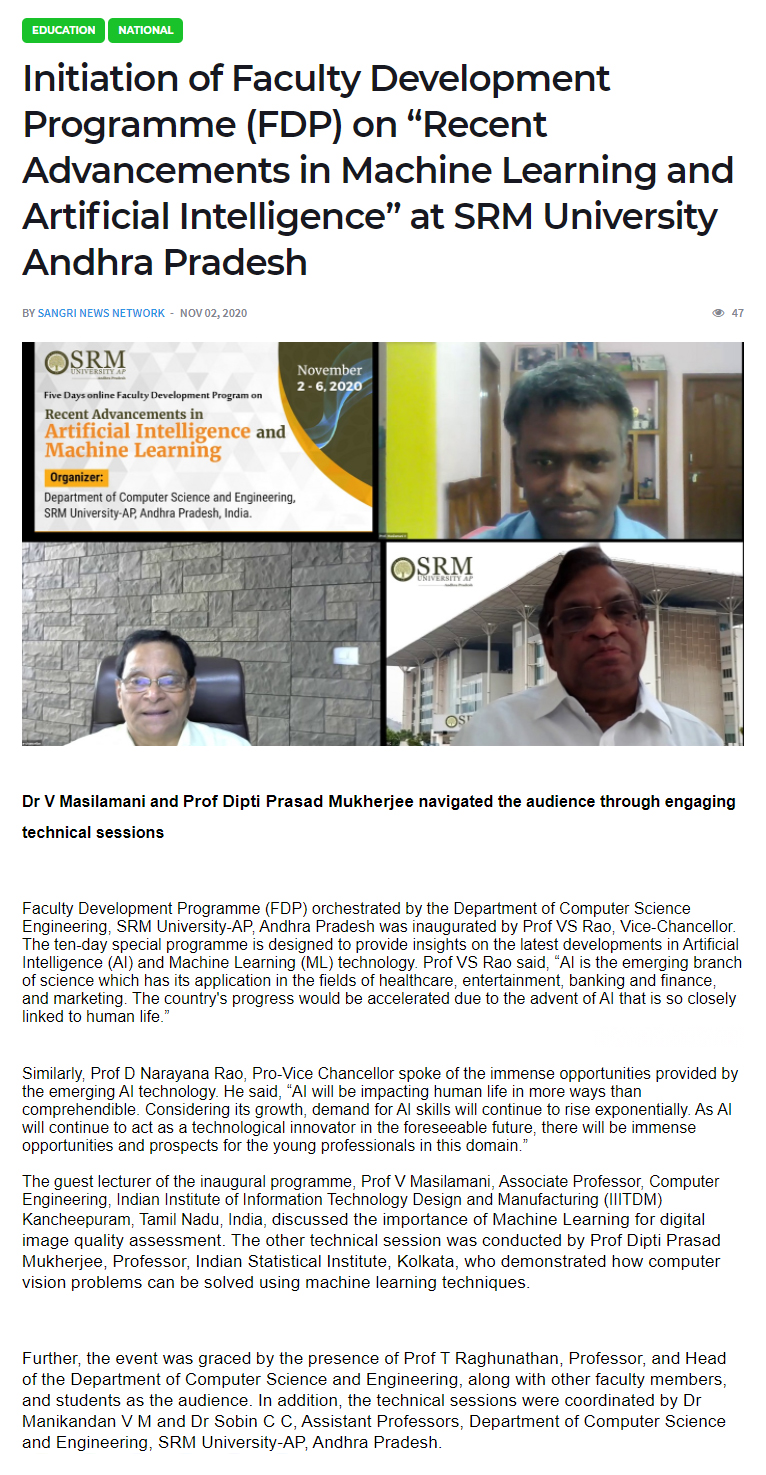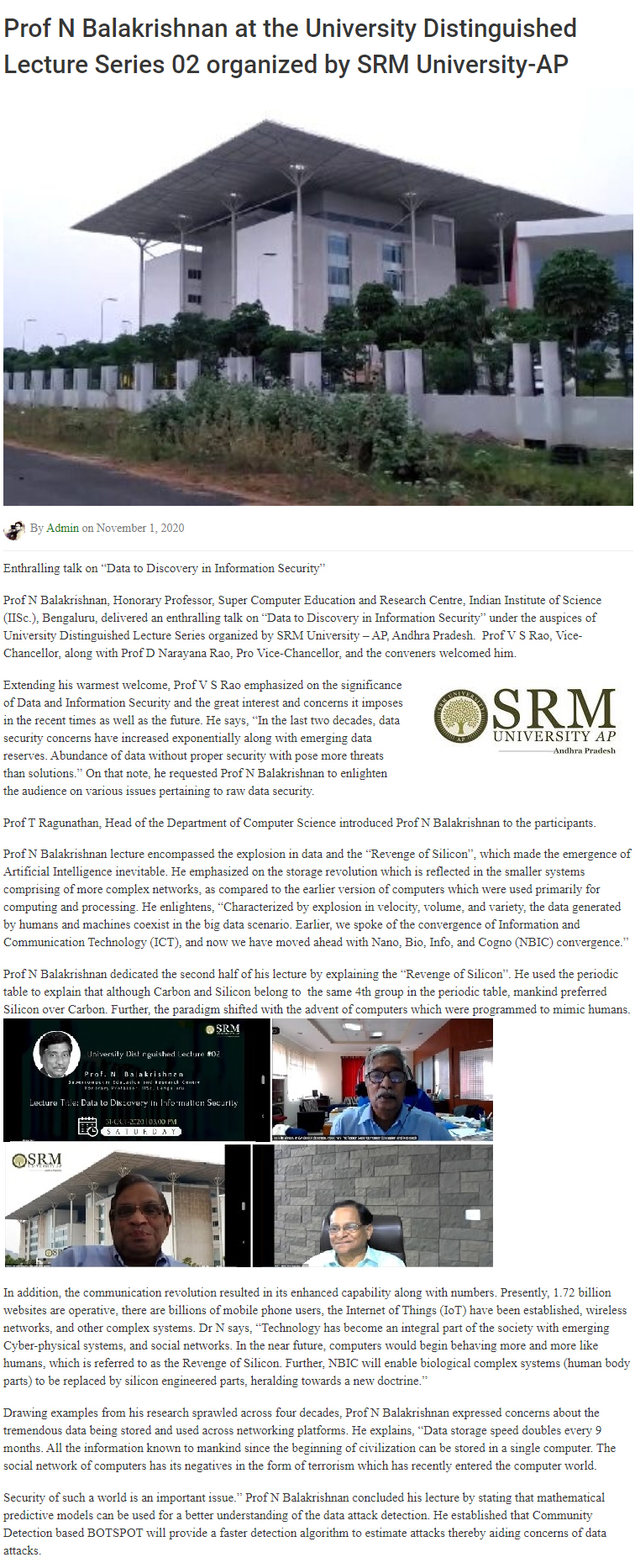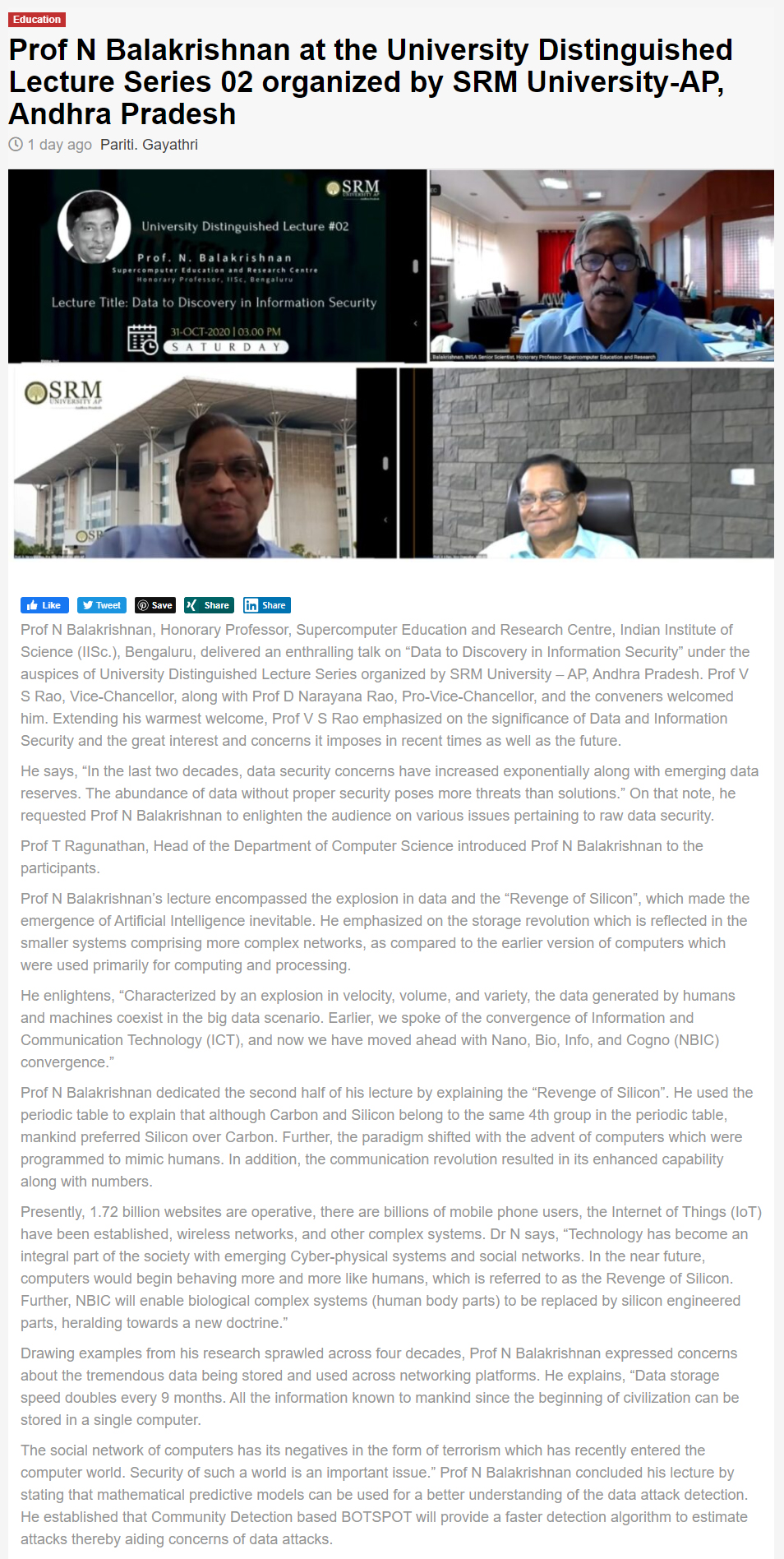All Management Events
- National Education Policy 2020 and the evolution of higher education November 7, 2020
“Innovation is the ability to see change as an opportunity – not a threat,” Steve Jobs
When Prime Minister Narendra Modi unveiled the National Education Policy 2020 on India’s 74th Independence Day, he asserted that it was aimed to make the country more self-reliant. NEP will give special attention to National Research Foundation because innovation is at the heart of India’s progress. Approved by the Union Cabinet and helmed by the newly named Education Ministry, NEP 2020 is all set to usher in immense transformations in higher education. Change driven towards innovation sounds like the need of the hour. But what does it actually mean?
Ministry sources have reiterated that NEP 2020 has been designed to promote skills-based education to arm students with practical skills. Moreover, the aim is to shape lateral thinking professionals of the future through an emphasis on multidisciplinary learning. The Education Ministry intends to follow through on these goals through these proposed changes:
-
Setting up a large multidisciplinary college in every district by 2030.
-
Setting up a large multidisciplinary college in every district by 2030.
-
All higher learning institutions will teach languages, music, arts, and literature.
-
In fact, the clear demarcations in Science and Arts streams’ curriculum will be blurred.
-
IITs and other institutions will be encouraged to create a holistic learning experience.
-
There will be a strong impetus for practical training and skills development (internships will be imbibed into curriculums from sixth grade)
-
Every higher learning institution will have an International Students Office in a bid to make India a sought after destination for foreign students.
These are just some of the changes NEP 2020 set into motion after its implementation. They are expected to promote these broad changes in higher education in the country. -
Students will be encouraged to gain practical exposure instead of simply learning theoretical concepts.
-
Students will develop research focus and will be geared towards innovation while gaining insights into Liberal Arts.
-
Value-based learning will come into focus as there will be a push for nurturing future professionals with a strong sense of ethics.
-
Overall, the proposed changes have the potential of transforming Indian colleges and universities and bringing them on par with the best in the world.
The announcement of NEP 2020 is probably one of the most unanticipated moves in the Indian education system. Several higher learning institutions are bound to be caught off guard and will be playing catch up for some time. On the other hand, universities like SRM AP will have the edge with its multidisciplinary approach and focus on practical training, already in place. The University is also leading the way with its emphasis on research and innovation as students get an enriching experience through numerous projects and internships.
That’s one of the primary goals for NEP 2020, and SRM AP is already on it. After all, it has come into being with the purpose of becoming an Indian University that truly is at global standards; a while before NEP 2020 made it a mission.
Continue reading → -
- Artificial Intelligence and its high relevance in higher education November 7, 2020
From the classic Blade Runner to iRobot, Her to the eponymous AI, our fascination about Artificial Intelligence has been detailed in many blockbuster movies across decades. But curiosity too breeds contempt. In this instance, it has led to the fear that AI will make human workforce redundant in many industry sectors. But it’s a fear that has been assuaged by many global experts. In fact, the World Economic Forum has gone as far as to predict that AI may lead to a net increase of 58 million jobs globally.
“Some people call it Artificial Intelligence. But the reality is, this technology will enhance us. So, instead of Artificial Intelligence, I think we will augment our intelligence,” claimed Ginni Rometty, CEO, IBM. At any rate, AI has the potential of causing the most powerful industry disruptions and innovations. We are already seeing popular examples in the form of self-driven cars, diagnosis and surgeries in healthcare, and the presence of robotic assistants in people’s homes. The opportunities are bound to be limitless.
Why AI and new technologies are integral to modern higher education
According to an Ernst & Young report, more than half of senior AI professionals believe there is a skill gap in the recruitment of new scientists, which has led to a talent crisis. New technologies including AI, Machine Learning, Blockchain will see a growing demand for professionals in times to come. Hence gaining knowledge and practical exposure in these areas has to be seen as a way of future-proofing your careers. It’s interesting to note that the careers in these new-age technologies are not reserved for students with tech background alone.
“I don’t think we need to prepare all students to be programmers or developers. But even future MBAs should be able to communicate with tech professionals with some insights into the area,” says Prof. Allen Huang, HKUST, MBA. He cites the example of top listed companies and the majority of economic drivers, which largely belong to the tech industry. The revolution of new technologies is here. And higher learning institutions can serve their students well and keep them ahead of the learning curve by introducing cutting edge courses into their curriculum.
AI careers of today and tomorrow
INDEED, a leading global job site, reports a whopping 344% growth in jobs for Machine Learning Engineers from 2015-19. Robotics Engineers, Computer Vision Engineers, and Data Scientists jobs have seen a rise of 128%, 116%, and 78% respectively in the same period. Some of the industry sectors that offer significant career opportunities for professionals with knowledge of AI and new technologies include Cyber Security, Healthcare, Supply Chain Management, IT, Construction, Transportation, Education, Retail, and of course IT.
But besides the burgeoning opportunities, it’s the quality of careers that these technologies offer that make them a hugely appealing prospect. “Unlike careers where a path has been laid out over decades, AI is still in infancy. It means you can form your own path and be creative,” said Dan Ayoub, General Manager for mixed reality education, Microsoft. So the top guns Microsoft included like Google, Amazon, and Apple can be just the starting points in your careers. The scope AI and new technologies offer your careers, is tremendous, to say the least.
AI education in India
Though in its nascent stages, AI and new technologies have found their place in programs and curriculums in India. It’s interesting that relatively new universities like SRM AP, that are leading the charge by incorporating new-age courses and labs on campuses. Its M. Tech in Artificial Intelligence and Machine Learning is designed to give students the edge in their specialized careers of tomorrow. But that’s not all; as a University that focuses on a multidisciplinary approach, these courses find their place in several programs including MBA.
Industry oriented courses in Artificial Intelligence, Big Data Analytics, Machine Learning, Internet of Things, Cyber Security, Distributed and Cloud Computing can be chosen by students across different domains. SRM AP also runs the Next Tech lab to encourage, enable, and shape future game-changers. Designed to catalyze innovations the lab is a platform for incubation of ideas and gives students the opportunity to work on projects with industry names. It clearly understands that the time is now. AIther you keep up or be left behind.
Continue reading → - Prof Budaraju Srinivasa Murty to share insights during University Distinguished Lecture Series 03 November 5, 2020
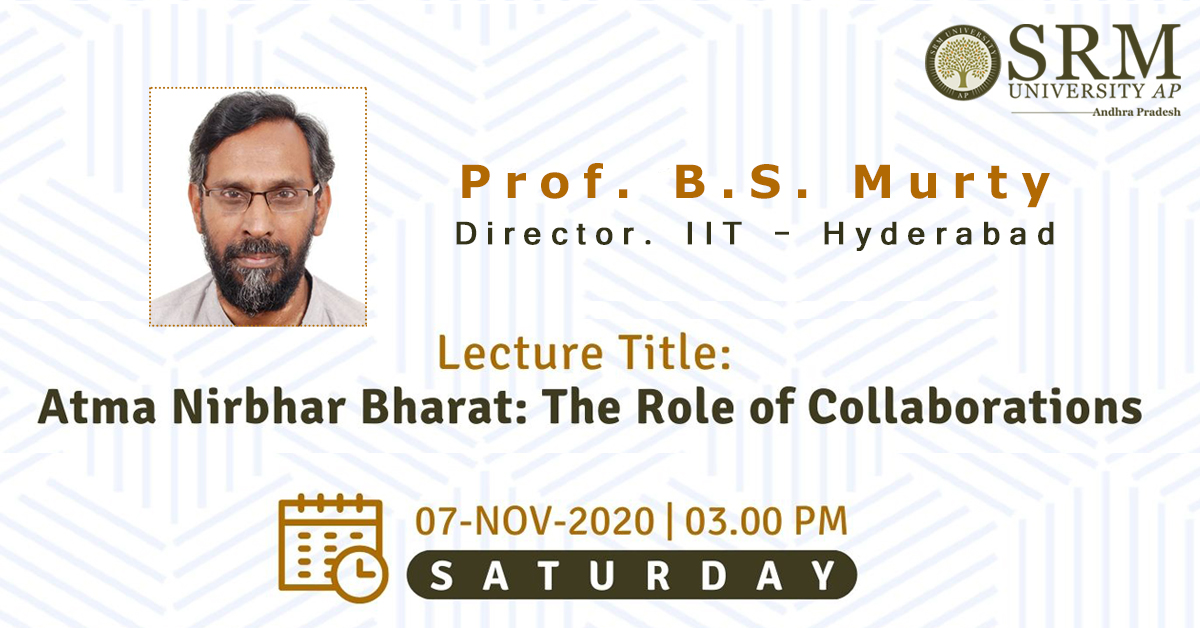 SRM University-AP, Andhra Pradesh, orchestrates the third chapter of the University Distinguished Lecture Series on “Atma Nirbhar Bharat: The role of collaborations”. Prof Budaraju Srinivasa Murty, Director of Indian Institute of Technology, Hyderabad, will be adorning the webinar with his presence on November 7, 2020, at 3 p.m. Prof B SMurthy is an Indian metallurgist who has been awarded the Shanti Swarup Bhatnagar Prize for Science and Technology in 2007, the highest science award in India. Formerly, he was the Head of the Department at Indian Institute of Technology, Madras after being the Professor at Indian Institute of Technology, Kharagpur. The celebrated scientist will be demonstrating how collaborative research will steer India towards achieving its dream of being Self Reliant by innovating technology through collective wisdom.
SRM University-AP, Andhra Pradesh, orchestrates the third chapter of the University Distinguished Lecture Series on “Atma Nirbhar Bharat: The role of collaborations”. Prof Budaraju Srinivasa Murty, Director of Indian Institute of Technology, Hyderabad, will be adorning the webinar with his presence on November 7, 2020, at 3 p.m. Prof B SMurthy is an Indian metallurgist who has been awarded the Shanti Swarup Bhatnagar Prize for Science and Technology in 2007, the highest science award in India. Formerly, he was the Head of the Department at Indian Institute of Technology, Madras after being the Professor at Indian Institute of Technology, Kharagpur. The celebrated scientist will be demonstrating how collaborative research will steer India towards achieving its dream of being Self Reliant by innovating technology through collective wisdom.Registration Link : https://bit.ly/srmapUDL03 (Registration Closed)
Continue reading → - Prof N Balakrishnan at the University Distinguished Lecture Series 02 organized by SRM University-AP, Andhra Pradesh November 5, 2020
Enthralling talk on “Data to Discovery in Information Security”
 Prof N Balakrishnan, Honorary Professor, Super Computer Education and Research Centre, Indian Institute of Science (IISc.), Bengaluru, delivered an enthralling talk on “Data to Discovery in Information Security” under the auspices of University Distinguished Lecture Series organized by SRM University – AP, Andhra Pradesh. Prof V S Rao, Vice-Chancellor, along with Prof D Narayana Rao, Pro Vice-Chancellor, and the conveners welcomed him. Extending his warmest welcome, Prof V S Rao emphasized on the significance of Data and Information Security and the great interest and concerns it imposes in the recent times as well as the future. He says, “In the last two decades, data security concerns have increased exponentially along with emerging data reserves. Abundance of data without proper security with pose more threats than solutions.” On that note, he requested Prof N Balakrishnan to enlighten the audience on various issues pertaining to raw data security.
Prof N Balakrishnan, Honorary Professor, Super Computer Education and Research Centre, Indian Institute of Science (IISc.), Bengaluru, delivered an enthralling talk on “Data to Discovery in Information Security” under the auspices of University Distinguished Lecture Series organized by SRM University – AP, Andhra Pradesh. Prof V S Rao, Vice-Chancellor, along with Prof D Narayana Rao, Pro Vice-Chancellor, and the conveners welcomed him. Extending his warmest welcome, Prof V S Rao emphasized on the significance of Data and Information Security and the great interest and concerns it imposes in the recent times as well as the future. He says, “In the last two decades, data security concerns have increased exponentially along with emerging data reserves. Abundance of data without proper security with pose more threats than solutions.” On that note, he requested Prof N Balakrishnan to enlighten the audience on various issues pertaining to raw data security. Prof T Ragunathan, Head of the Department of Computer Science introduced Prof N Balakrishnan to the participants. Prof N Balakrishnan lecture encompassed the explosion in data and the “Revenge of Silicon”, which made the emergence of Artificial Intelligence inevitable. He emphasized on the storage revolution which is reflected in the smaller systems comprising of more complex networks, as compared to the earlier version of computers which were used primarily for computing and processing. He enlightens, “Characterized by explosion in velocity, volume, and variety, the data generated by humans and machines coexist in the big data scenario. Earlier, we spoke of the convergence of Information and Communication Technology (ICT), and now we have moved ahead with Nano, Bio, Info, and Cogno (NBIC) convergence.”
Prof N Balakrishnan dedicated the second half of his lecture by explaining the “Revenge of Silicon”. He used the periodic table to explain that although Carbon and Silicon belong to the same 4th group in the periodic table, mankind preferred Silicon over Carbon. Further, the paradigm shifted with the advent of computers which were programmed to mimic humans. In addition, the communication revolution resulted in its enhanced capability along with numbers. Presently, 1.72 billion websites are operative, there are billions of mobile phone users, the Internet of Things (IoT) have been established, wireless networks, and other complex systems. Dr N says, “Technology has become an integral part of the society with emerging Cyber-physical systems, and social networks. In the near future, computers would begin behaving more and more like humans, which is referred to as the Revenge of Silicon. Further, NBIC will enable biological complex systems (human body parts) to be replaced by silicon engineered parts, heralding towards a new doctrine.”
Drawing examples from his research sprawled across four decades, Prof N Balakrishnan expressed concerns about the tremendous data being stored and used across networking platforms. He explains, “Data storage speed doubles every 9 months. All the information known to mankind since the beginning of civilization can be stored in a single computer. The social network of computers has its negatives in the form of terrorism which has recently entered the computer world. Security of such a world is an important issue.” Prof N Balakrishnan concluded his lecture by stating that mathematical predictive models can be used for a better understanding of the data attack detection. He established that Community Detection based BOTSPOT will provide a faster detection algorithm to estimate attacks thereby aiding concerns of data attacks.
Continue reading → - PayPal recruits Sai Rishvanth Katragadda November 4, 2020
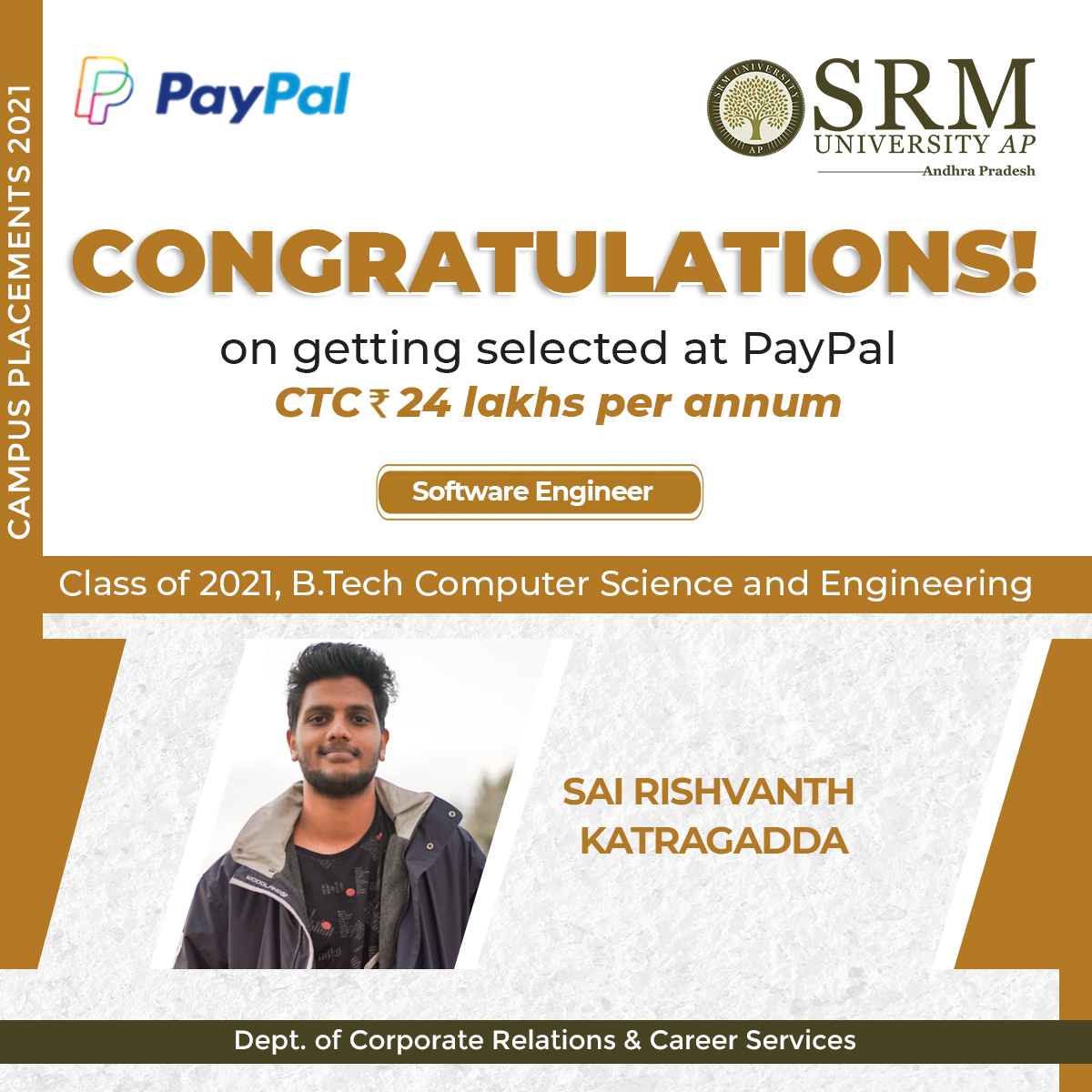 Sai Rishvanth Katragadda, Final year, Department of Computer Science and Engineering, SRM University-AP, Andhra Pradesh shone in the recruitment drive conducted for the first outgoing batch of the university. Sai Rishvanth got selected by the recruiters of PayPal who offered the brilliant student a package of 24 LPA for the position of Software Engineer. PayPal is a reputed company that provides a worldwide online payment system, online money transfers, and serves as an electronic alternative to traditional paper methods.
Sai Rishvanth Katragadda, Final year, Department of Computer Science and Engineering, SRM University-AP, Andhra Pradesh shone in the recruitment drive conducted for the first outgoing batch of the university. Sai Rishvanth got selected by the recruiters of PayPal who offered the brilliant student a package of 24 LPA for the position of Software Engineer. PayPal is a reputed company that provides a worldwide online payment system, online money transfers, and serves as an electronic alternative to traditional paper methods.Sai Rishvanth has consistently exhibited his mettle in academics and has been scoring excellently in all the examinations conducted by SRM AP. He was also selected by the university to visit the University of California, Berkeley for the Semester Abroad Programme. In addition, he grabbed the opportunities presented by SRM AP and worked on projects where he developed applications to provide solutions in the domain of travel, predictive data analysis, crowdfunding, crypto-token, and environment.
Guided by the faculty, and founders of the student-run Next Tech Lab at SRM AP, Sai Rishvanth participated in innumerable national and international hackathons to win several accolades and awards. Further, the student at an immensely young age received the opportunity to present papers in international conferences and publish his paper in the esteemed journal Springer Journal for Engineering and Sciences.
For detailed campus placement information, visit: Please Click Here
Continue reading → - Initiation of FDP on “Recent Advancements in Machine Learning and Artificial Intelligence” at SRM University-AP, Andhra Pradesh November 4, 2020
Business News This Week – Nov 03
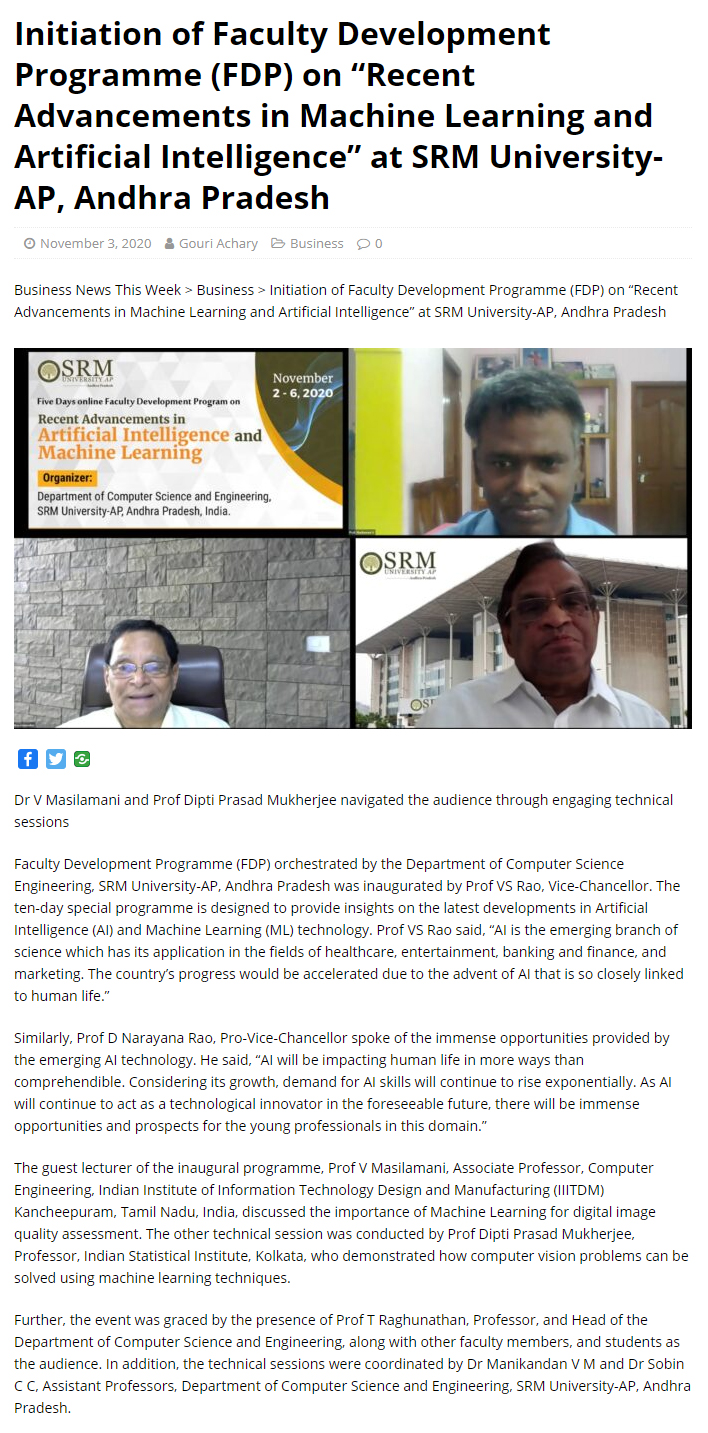
Higher Education Digest – Nov 03
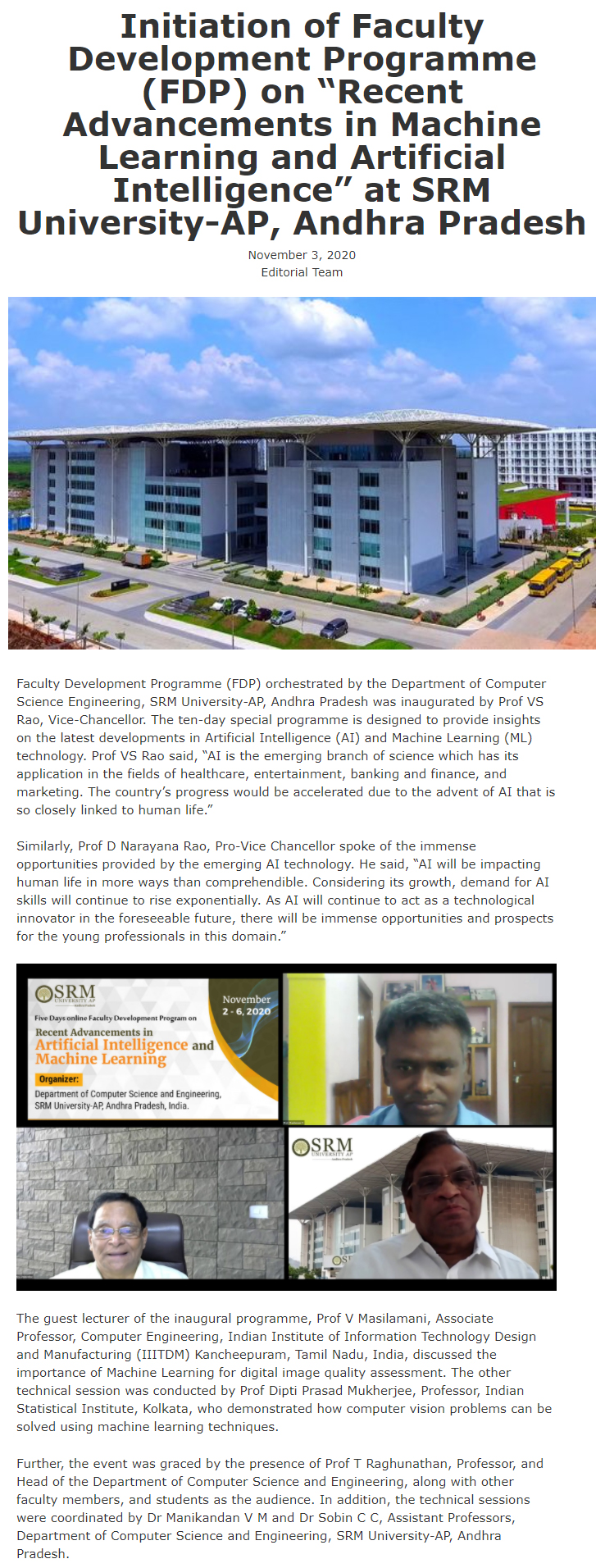
Eenadu – Nov 03
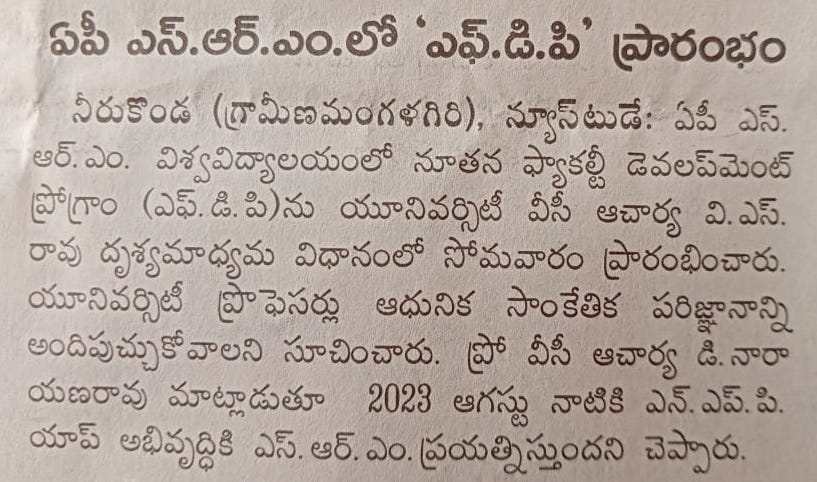
Andhra Prabha – Nov 03
Continue reading →
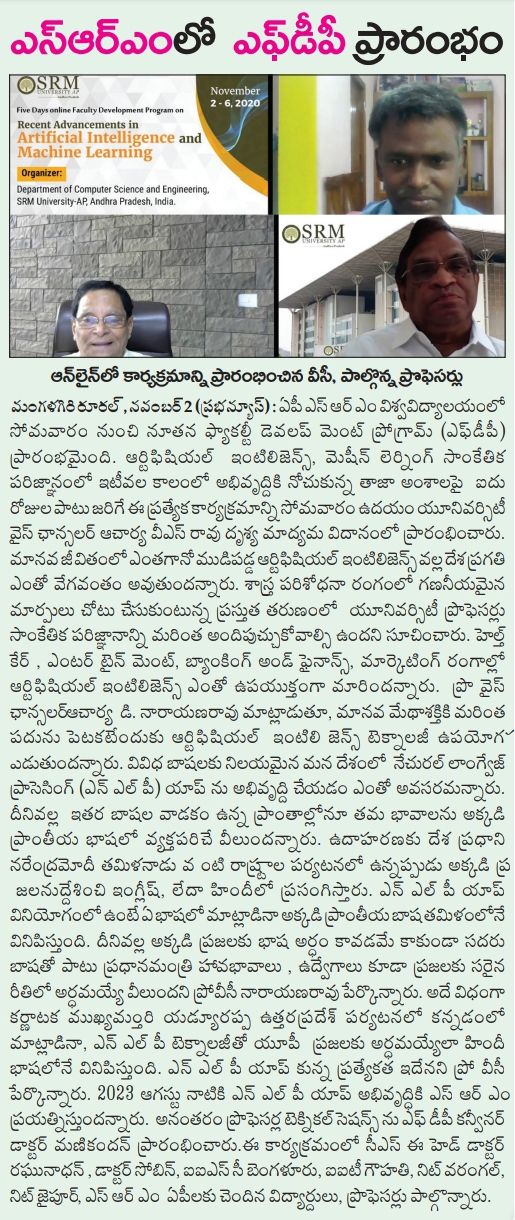
- Prof N Balakrishnan at the University Distinguished Lecture Series 02 organized by SRM University-AP, Andhra Pradesh November 3, 2020
The Hans India – Nov 02

The Hawk – Nov 02
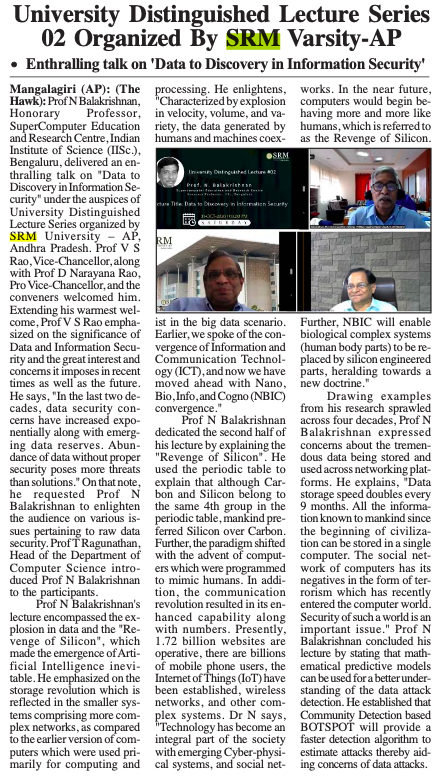
Deccan Chronicle – Nov 02

Business News This Week – Nov 02
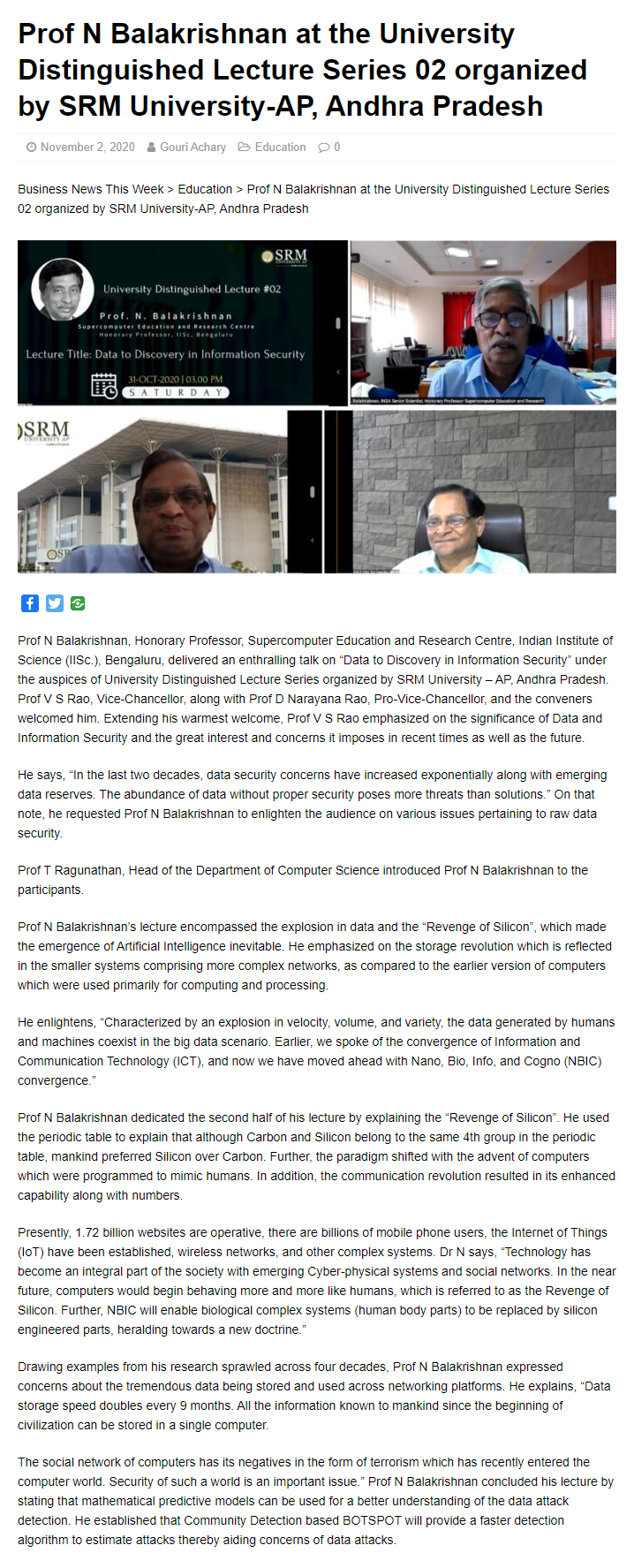
Higher Education Digest – Nov 02
Continue reading →

- Dr Vaishnavi Ravi October 31, 2020
- Ms Ruby will be addressing the audience in a session titled “Being Job Ready” October 31, 2020
Continue reading → Department of Corporate Relations and Career Services, SRM University-AP, Andhra Pradesh has arranged a session titled “Being Job Ready” on October 31, 2020, at 2 p.m. Ms Ruby will be addressing the audience during the webinar to advise them on the measures to be taken to secure their dream job offers. Ms Ruby has rich and varied experience in various facets of “People Function” in a cross-cultural environment with a multi-generational workforce. She has extensive experience in Talent Management, Business HR Partnering, CSR, and Compliance. Previously, she has worked as an HRBP in BI Worldwide. Currently, she is a talent business partner in the product development division of ADP -India.
Department of Corporate Relations and Career Services, SRM University-AP, Andhra Pradesh has arranged a session titled “Being Job Ready” on October 31, 2020, at 2 p.m. Ms Ruby will be addressing the audience during the webinar to advise them on the measures to be taken to secure their dream job offers. Ms Ruby has rich and varied experience in various facets of “People Function” in a cross-cultural environment with a multi-generational workforce. She has extensive experience in Talent Management, Business HR Partnering, CSR, and Compliance. Previously, she has worked as an HRBP in BI Worldwide. Currently, she is a talent business partner in the product development division of ADP -India. - Dr Sangeeta Sharma to inspire students during the 2nd Orientation Programme 2020 October 31, 2020
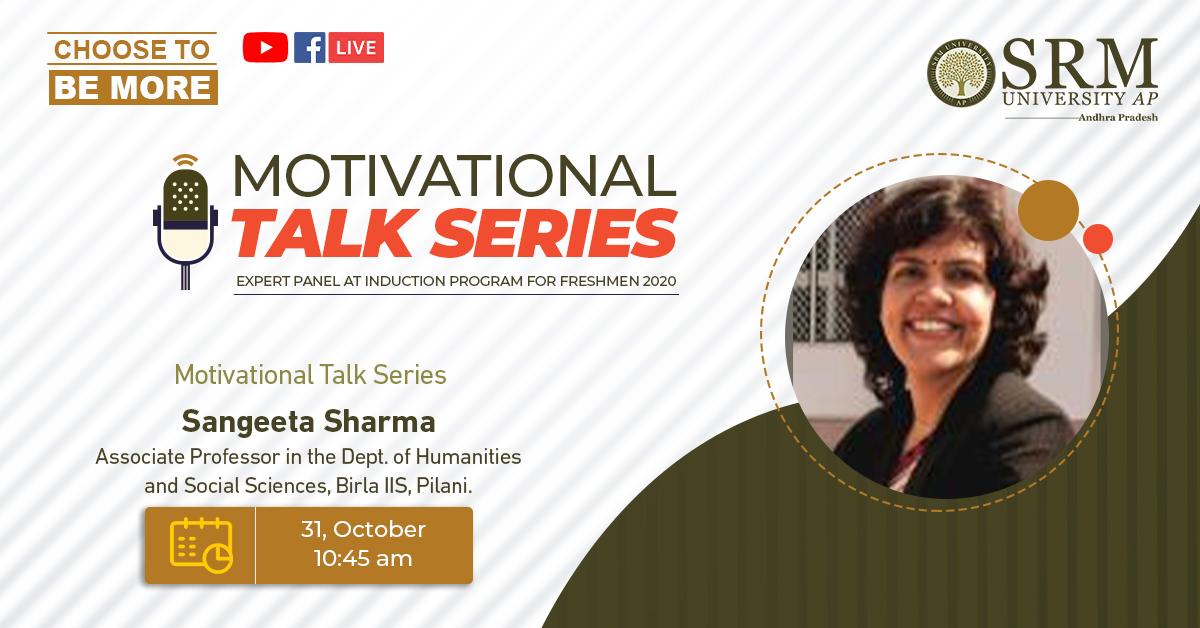 Dr Sangeeta Sharma, Associate Professor, Department of Humanities and Social Sciences, Birla Institute of Technology and Science, Pilani will be addressing the Freshmen 2020 during the 2nd Orientation Programme organized by SRM University-AP, Andhra Pradesh on October 31, 2020, at 10.45 a.m. Dr Sharma is an academician of par excellence and was the head of Publication and Media Relations Unit, along with being the Group Leader of the Department of Humanities and Social Sciences.
Dr Sangeeta Sharma, Associate Professor, Department of Humanities and Social Sciences, Birla Institute of Technology and Science, Pilani will be addressing the Freshmen 2020 during the 2nd Orientation Programme organized by SRM University-AP, Andhra Pradesh on October 31, 2020, at 10.45 a.m. Dr Sharma is an academician of par excellence and was the head of Publication and Media Relations Unit, along with being the Group Leader of the Department of Humanities and Social Sciences. Dr Sharma possesses a gamut of experience in classroom delivery, corporate connect and training, writing books and research papers, paper presentation in national and international conferences, editorial work, and organizing academic events, etc. She has published 26 books and 45 research papers in the area of gender studies, advertising, cultural studies, and communication in reputed journals.
Further, Dr Sharma was the Coordinator of Center for Women Studies (CWS), which had diverse range of activities to help women benefit from technology. She is a licensed trainer for Springboard Development Program (U.K.), which is an internationally recognized women’s development programme. She has also successfully completed the project “Rural women empowerment and sustainable growth”, where she supervised the production of low-cost sanitary napkins by the rural women, which made them independent.
Continue reading →


